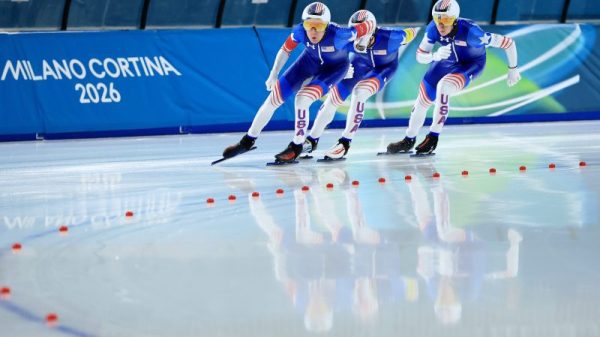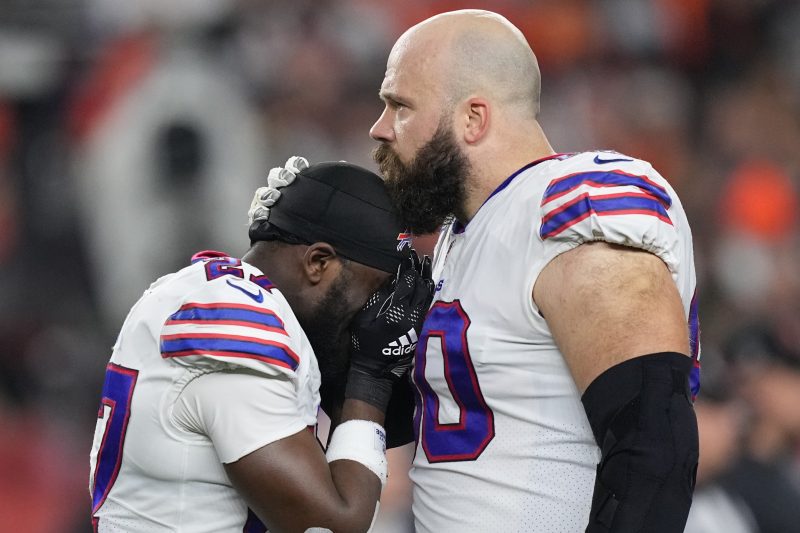It was less than an hour after Buffalo Bills safety Damar Hamlin collapsed on the field in Cincinnati that Turning Point USA’s Charlie Kirk decided to blame the injury on coronavirus vaccines.
He was circumspect in doing so, admittedly, offering his opportunistic observation with a wink rather than a shout.
“This is a tragic and all too familiar sight right now,” Kirk wrote on Twitter: “Athletes dropping suddenly.”
To someone outside of the narrative bubble that Kirk inhabits — the bubble Kirk actively inflates — this reads as a sober analysis of some subtle trend. To anyone familiar with Kirk and the right’s efforts to undercut confidence in coronavirus vaccines, though, what he’s saying is very obvious. Which was his point.
There are a few layers here that are worth picking out.
The first is the purported connection between “athletes dropping” and coronavirus vaccines. In short, a number of injuries, illnesses and unexpected performances have been linked without evidence to the athletes’ having been vaccinated. It’s quite explicitly cherry-picking: Anything even remotely linked to circulatory issues has been lumped into a vast “just asking questions!!” universe of suspicion, generally by those on the political right. It’s not that there is a demonstrable increase in illness among athletes; it’s that any illness in any athlete at any level now becomes fodder for inclusion in that universe. That some 70,000 Americans under the age of 45 have strokes each year means there are lots of cherries that might be plucked.
The overlap with politics is obvious. The political right’s response to the coronavirus pandemic slipped from grudging support for measures to limit the virus’s spread to outright opposition — thanks in large part to President Donald Trump’s determination that the country should put the virus behind it as his reelection approached. Trump and other Republicans disparaged public health experts and elevated fringe voices raising conspiracy theories about the virus. While Trump hoped to take credit for the rapid development and deployment of vaccines targeting the virus, those vaccines became associated with the administration of President Biden and spurred the same sort of backlash against official recommendations that boosted fringe, outsider covid-19 treatments like hydroxychloroquine.
The clearest demonstration of the right’s evolution is seen in Florida. Gov. Ron DeSantis (R) went from advocating closures to reopening fully while encouraging vaccination — to treating vaccines as not only dangerous but part of a concerted plot to defraud the public. This despite the vaccines having prevented millions of American deaths, according to recent research. But, for many, the political benefits of being a fervent vaccine opponent proved too compelling.
That includes Kirk, whose job at Turning Point USA appears to consist largely of engaging in fringe culture-war fights with an eye toward attracting attention and funding. But it’s not just Kirk and DeSantis who understand that vaccine skepticism is a path toward audience-building. Fox News’s Tucker Carlson has been powering the idea for months.
Even outlets like the increasingly fringe Rasmussen Reports are releasing surveys claiming that a large number of Americans believe they know someone who died of vaccine side effects — an effort to inject dubious evidence into the debate. (To bolster the legitimacy of the idea, Rasmussen points to a film from an extreme-right radio host named Stew Peters, who last May declared that his political enemies were “possessed by demons.”)
The idea that actual evidence from credentialed observers can be successfully rebutted with anecdotes and the musings of do-your-own researchers extends in various directions besides simply pointing at athlete injuries with an eyebrow raised. A common argument is that there has been a surge in excess deaths (that is, deaths above what would otherwise be expected) that correlates with increased coronavirus vaccinations. But, of course, this is in large part because thousands of people died of covid-19.
You can see that in data from the Centers for Disease Control and Prevention. Instantly, of course, some segment of readers will scoff at the idea that the CDC’s numbers are reliable, a view downstream from skepticism about any “official” figures. At that level of denialism, there’s no factual response that can suffice. For everyone else, though, the tabulated data is useful.
In 2021 and 2022, using weighted excess death estimates (to account for numbers that arrive months after deaths occur), it was states with lower rates of vaccination in mid-2021 that recorded more excess death. That holds both overall and for the group purportedly suffering from these vaccine-related deaths, those under the age of 50.
Again, there’s not much mystery here: Those states with lower rates of vaccination were also more likely to see higher rates of covid-19 deaths. That again holds true for younger Americans as well as for all residents of any given state.
In large part, this is because coronavirus vaccines have proved effective at preventing severe illness and death over the past two years. There may be other factors; states with higher vaccination rates probably also had more people taking preventive measures to avoid infection. But vaccination is a central reason and a clear point of correlation.
Again, these numbers are not competing with Kirk’s own medical research. They are competing with insinuations aimed at bolstering Kirk’s credentials with vaccine skeptics who refuse to accept the lack of evidence supporting the idea that vaccines are leading to frequent severe illness and death.
It’s not yet clear exactly what caused Damar Hamlin’s heart to stop beating briefly after he collided with another player on Monday night. That probably temporary uncertainty lets opportunists like Kirk step in and make a political claim, a claim that contributes to a vague sense of uncertainty about vaccines and a claim that will undoubtedly go uncorrected should the cause of Hamlin’s injury be clearly differentiated from anything vaccine-related.
Because it’s not about the evidence in the first place.



























